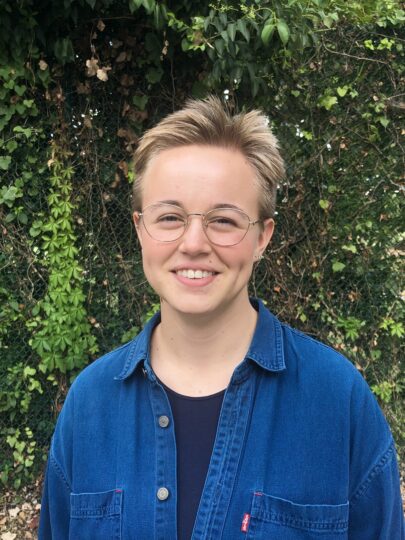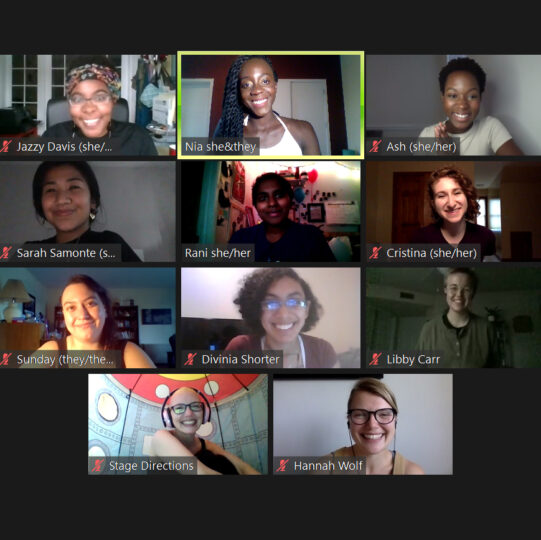We recently spoke with undergraduate student Libby Carr, who attended National New Play Network’s M.F.A. Playwrights’ Workshop this year. As one of only two undergraduate student playwrights selected nationwide, Carr participated in a virtual workshop of their play sad girl hours with a professional director, dramaturg and a collection of established actors. Carr shared their inspiration and goals for the play, the origins of this work in Patrick Shaw’s playwriting course and the lessons they have learned from working within a collaborative theatre community.

Can you tell me a little bit about yourself? What led you to theatre and playwriting?
I grew up in Houston, which shaped sad girl hours significantly; I think the queer arts community I grew up around in Houston shapes all of my writing significantly. I did community theatre as a kid and attended the High School for the Performing and Visual Arts, which was a new way for me to learn how a community could come together around the arts and collaborate within them. I came to UT and took a second to make sure theatre was really something I wanted to do for college— it took me until my sophomore year to find my way into the Department of Theatre and Dance. I think the way UT values new work and collaboration has really shifted how I want to work in the future.
Can you give me a brief synopsis of your play sad girl hours? What is the play about and what inspired you to write it?
sad girl hours is about five teenagers in a fallout shelter, applying to college while Houston floods again and again and again. Houston flooded truly countless times while I was in high school which I think made it impossible for people there to ignore the ongoing climate crisis. sad girl hours was really inspired by the idea of planning for your future, whatever that looks like, while also planning and preparing how to die and watching everything change dramatically due to something totally out of your control. I hope the play speaks to the power dynamics that affect the privilege to plan for the future. It’s also just a play about friends and queerness and being seventeen, when it feels like everything, however tiny or enormous, is the end of the world.
What about this work do you think speaks to audiences in our present moment?
I’ll just speak for myself, but I wrote sad girl hours in a world that is not the world we are currently living in. It was written pre-COVID and before the outpouring of anger at systemic racism and the murders of Black people in the U.S. I hope there are still things we can learn from it even though it wasn’t written for the world as it is now.
This summer I have been ignited and impassioned by the young people that are leading the most important revolutions of our generation. It’s particularly important for me that young people, especially young LGBTQ+ people, are given validity and seriousness in theatre—that even if we judge their problems as superficial on the surface, we can sit with them for an evening and start to understand that they are not superficial at all. These are extremely smart, serious, brilliant young people who have been affected in a huge variety of ways by the systems they grew up under and their families and environments. They are reflections of the power dynamics of race, class, gender and queerness that they have been taught. With sad girl hours I was exploring how important it is for us to understand that young peoples’ opinions and experiences are not at all trivial, that we need to listen to them. And I wonder whether, if we can get more people to listen to young people in the theatre, if they’ll listen in life too.
What has your process of writing sad girl hours been? What development steps had been taken before the M.F.A. Playwrights’ Workshop?
The first draft of sad girl hours was written in Patrick Shaw’s Playwriting III class. Patrick had us write a “secret play” while revising our main project for the semester, and sad girl hours grew out of that secret play. I didn’t touch the script again until last fall, when I was lucky enough to have a reading of it during the Dark Night Reading Series with a cast and director that hugely impacted how I imagined the work. I applied for this workshop with that draft and reworked it over the spring semester and then more this summer in preparation.
I think of sad girl hours as kind of an aspirational play—like, I remember not knowing a ton of people in UT’s department yet and literally thinking “maybe if I write a play and get people to read it they’ll want to be friends with me!” I think the friendships and the feelings of collective mourning and celebration in sad girl hours were really shaped by how overeager I felt to find people I connected with.

Congratulations on being selected to attend the M.F.A. Playwrights’ Workshop! How has the development process with the workshop impacted sad girl hours and yourself as a writer?
Thank you so much! This was my first time in a development process like this and I went into it feeling SO nervous. Now on the other side of the workshop I’m just really grateful for the team of folks I got to work with. The workshop paired me with director Hannah Wolf, a UT alumna (M.F.A. 2018), who made me feel so comfortable because she knew exactly where I was coming from. Hannah and the entire team were so generous with their thoughts and questions throughout the week— they gave me a ridiculous amount of ideas that I’m going to be chewing on for a long time.
As for myself as a writer, I think if any amount of myself still thought of playwriting as a solitary practice before this workshop, that has disappeared. The amount of people that have impacted sad girl hours since it started being written is essentially countless, and it hasn’t even existed very long. I hope I’m developing into a more collaborative writer than I was a year ago. I hope I’m more understanding and receptive now and simultaneously better able to stand up for my own writing. I think I’m moving in that direction, and I think the workshop helped a lot.
What are your plans for the future of this play? Any readings/stagings in the near (or distant) future?
I have so much work to do! A lot to think about and a lot to write. I hope to see sad girl hours get done somewhere soon though.
Do you have any other plays or projects that are currently in the works?
I’m starting work on my thesis this fall, which is an adaptation of chapter 9 of Ovid’s Metamorphoses, the story of Iphis and Ianthe. At least right now that’s what my thesis is; I’m also thinking about a different, very Texas-y play that might be my secret play while I write my thesis.
What does being selected as one of few undergraduates to attend the National New Play Network’s M.F.A. Playwrights’ Workshop mean to you?
It means I’m lucky and very thankful! I have phenomenal teachers, peers and friends who are so generous with their time to read stuff I write and give me their thoughts on it. The workshop also made me realize that this is really what I want to be doing right now— whether or not that will change in the next few years I don’t know, but right now, writing and collaborating are very important to me, and I’m very happy to have the space to be doing it.

